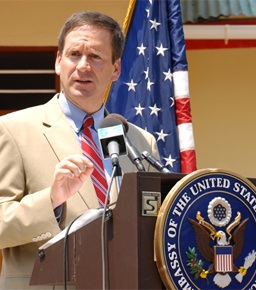
It’s hard for Americans to fully grasp the terrible toll malaria has taken on Africa. Experts can highlight the stark numbers — that malaria kills nearly 700,000 people each year and that eighty-five percent of these victims are children under five. They can point out that it costs Africa $12 billion each year in lost productivity. But somehow the statistics don’t really convey the damage the disease has inflicted on countless families and communities.
When my wife and I were volunteer teachers in Africa 25 years ago, malaria’s dark shadow could be felt everywhere. I remember meeting person after person who would describe themselves with phrases like “I was third-born, so I am the oldest.” I remember one of our students going into seizures on the very morning of final exams, as cerebral malaria struck him down. I also remember how everyone assumed that malaria was simply a fact of life … and death.
These days, we hear so much about government programs that don’t work … But we shouldn’t let these stories obscure what is working so well.
These days, we hear so much about government programs that don’t work. Stories of waste and lack of accountability have the average American shaking his or her head in disgust — and rightfully so. But we shouldn’t let these stories obscure what is working so well. In short, thanks to bold leadership and the innovative application of sound business principles, as well as the generosity of the American people, the incidence of malaria is dropping sharply; child mortality in Africa is dramatically declining; and Republicans should be very proud.
The U.S. government has long supported global efforts to fight malaria. However, the American contribution to this cause was fairly modest, and our anti-malaria programming was inefficiently planted in several parts of our government. In 2005, building on early lessons learned from visionary development initiatives like the Millennium Challenge Corporation (MCC) and the President’s Emergency Plan for AIDS Relief (PEPFAR), President George W. Bush launched a historic plan to mobilize proven technologies and focus necessary resources on fifteen targeted African countries. Instead of the old input approach, in which officials would figure out how much money they could get from Congress and then divide it among a large number of countries, the new President’s Malaria Initiative (PMI) charted an outcome-focused path.
PMI began with a determination of what it would take to produce real, sustainable results. It then selected “focus countries” in which PMI could make an immediate difference — countries with a heavy malaria burden, but also with government leaders who were ready to take the comprehensive steps necessary to turn back the disease. These leaders had to create clear lines of authority, commit the necessary health care resources to build their end of the partnership, and also be ready to embark on a public education campaign around the disease. PMI made sure that each country would develop and lead a battle plan unique to its own on-the-ground needs.
Back here in the U.S., the Bush Administration forged an interagency leadership structure overseen by a U.S. Global Malaria Coordinator and an interagency steering group representing all the necessary players— from USAID and the CDC to the Departments of State and Defense and the Office of Management and Budget. The President chose Rear Admiral Tim Ziemer (retired) to lead the PMI effort. Admiral Ziemer not only had extensive experience in the humanitarian field, having grown up in Asia as the son of missionary parents, but he was a proven leader in logistics, having commanded squadrons, naval air stations, and eventually the Navy’s entire Mid-Atlantic Region.
…thanks to bold leadership and the innovative application of sound business principles, as well as the generosity of the American people, the incidence of malaria is dropping sharply; child mortality in Africa is dramatically declining; and Republicans should be very proud.
Just as I saw firsthand the terrible costs of malaria, I have also seen for myself the tremendous progress that PMI has helped to create. On the islands of Zanzibar, for example, the malaria prevalence rate has fallen to less than one percent. In 2010, when I visited a small hospital there, I found a largely empty pediatric ward. My host, Dr. Mohamed Jiddawi, Principal Secretary for the Ministry of Health, beamed and told me that just a few years earlier there would have been a ward full of suffering children, often two or three to a bed. Many would be dying. “But today,” he said, “there are no malaria patients.”
Since 2000, malaria mortality rates have fallen globally by 25 percent and, in Africa, by thirty-three percent. While malaria remains a leading killer of young children and pregnant women, more and more countries are seeing dramatic improvements. Not only are there fewer sick children, but the terrible burden on health systems, public budgets, and employers — not to mention families — is slowly beginning to recede.
As an American, I am proud that my country has helped to lift so many lives through our global health programs like PMI. We have shown in clear, unmistakable terms what Americans stand for — hope to friends in need. As a Republican, I am especially proud that it was a Republican president who took the first bold steps in creating these life-saving initiatives. Well done! RF
___________________________________
Mark Green served as the U.S. Ambassador to Tanzania from 2007-09. Prior to that, from 1999-2007, he represented Wisconsin’s 8th Congressional District in the U.S. House of Representatives. He is currently Senior Director at the U.S. Global Leadership Coalition.




